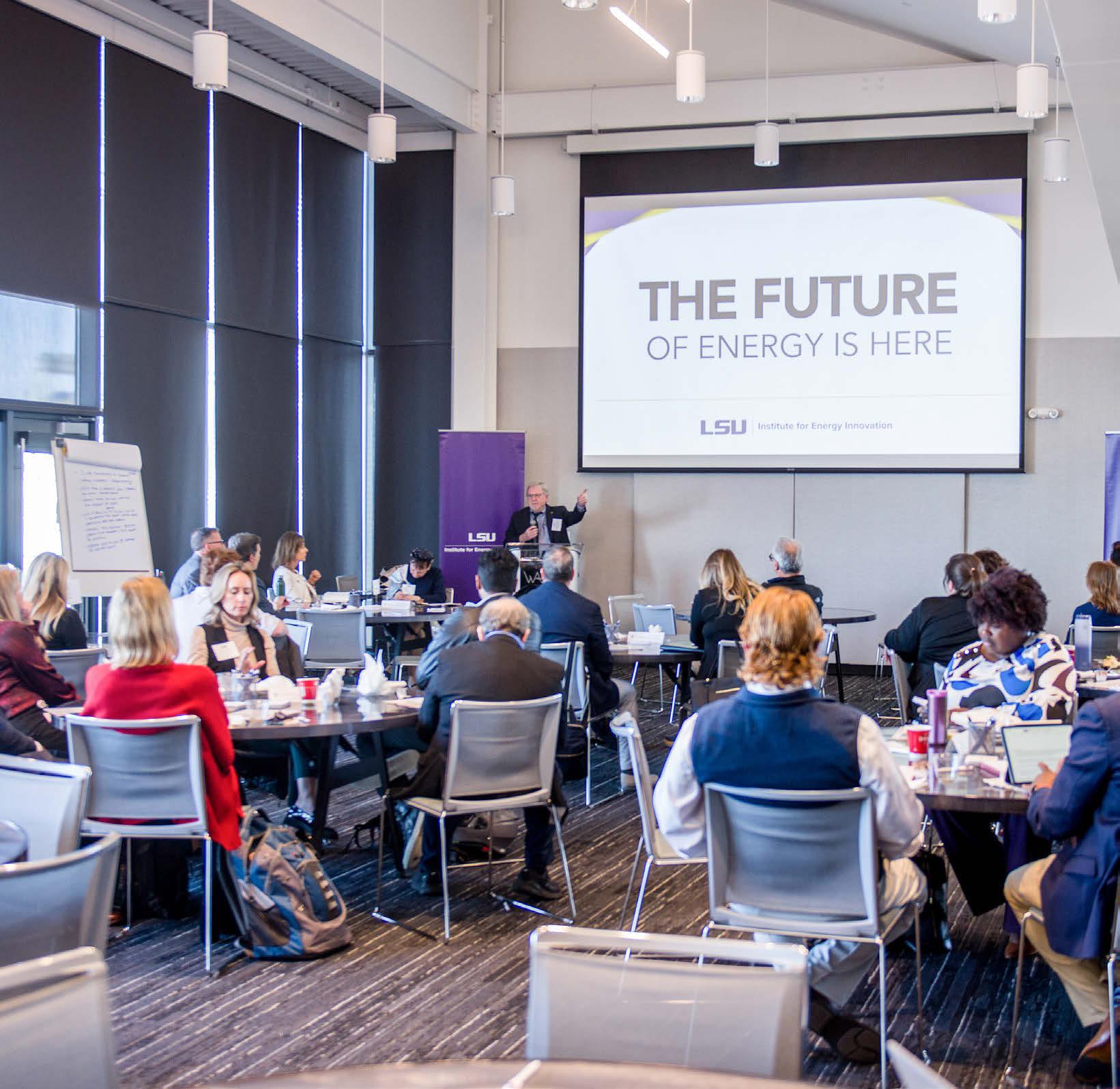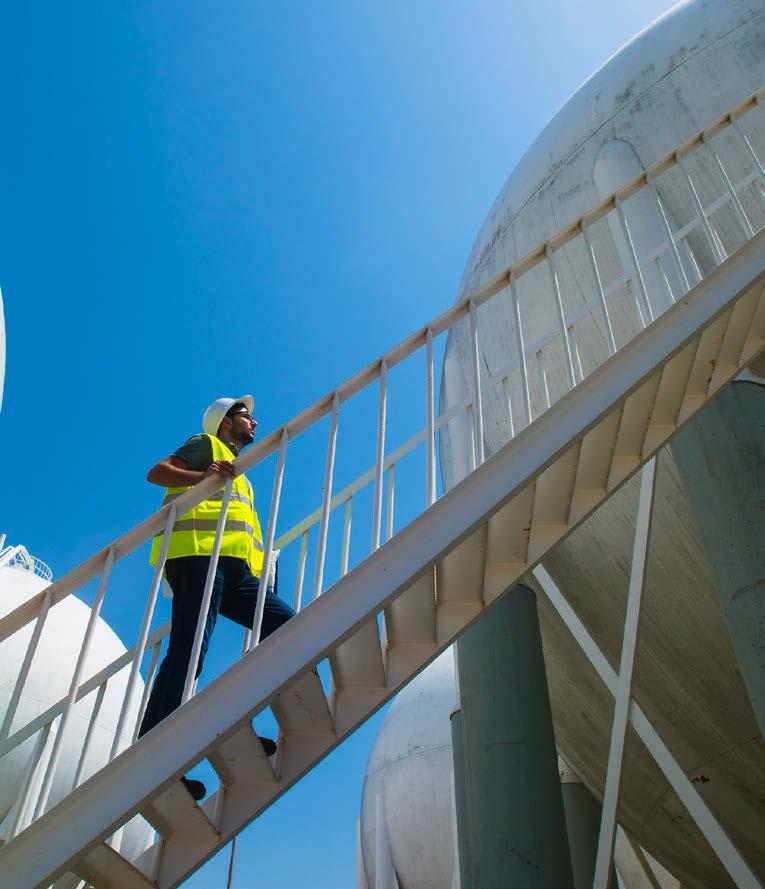ANNUAL REPORT2023





I AM HAPPY to share the inaugural annual report for the Louisiana State University Institute for Energy Innovation. The institute was founded in 2022 through a $25 million gift by Shell. This report details our progress and accomplishments during 2023, our first full year.
First, I’d like to offer a sincere thank you to Rhoman Hardy for serving as interim director. As the visionary responsible for the institute, no one was in a better position to set its initial course. Thanks to Rhoman, I inherited a strong institute with an excellent reputation when I joined in October.
Rhoman and I both received incredible support from the LSU Foundation and LSU’s Office of Research and Economic Development. The institute began in 2023 with no employees and finished with just one, so these two groups were critical in managing day-to-day operations while setting the stage for long-term success.
The LSU Foundation was also active in building the institute’s relationships with the energy and chemical industries in Louisiana. We finished the year with ExxonMobil joining Shell as financial supporters of the institute and built strong relationships with numerous other companies that will be strong partners in the future.
As a result of our solid financial support and growing industry relationships, the institute made substantial progress toward our goal of advancing LSU’s Scholarship First Agenda while beginning research activities that are critical to Louisiana’s energy future. Highlights include the establishment of our Academic Advisory Committee in April and hosting our first energy innovation workshop with faculty and industry representatives in August. The collaboration between these groups led to the funding at year-end of our first 10 research projects that cover carbon capture, utilization, and storage and solar energy, while incorporating environmental justice concerns.
Leading this institute is the opportunity of a lifetime for me. Louisiana is at the forefront of the evolution of energy at a critical time in human history. LSU is uniquely positioned to lead the development of new technologies, financing techniques, community engagement methods, and public policies that will ensure all Louisianans thrive in the exciting future we are pursuing together. The LSU Institute for Energy Innovation will be a trusted voice and world leader in this effort.
Thank you for your continued support and engagement. I invite you to explore this report to learn more about our achievements and ongoing initiatives.
Best wishes,
 BRAD IVES Director, LSU Institute for Energy Innovation
BRAD IVES Director, LSU Institute for Energy Innovation
A national model, where leaders in energy-related thought, talent development and industry will have the opportunity to invest in the pursuit of a shared vision for the future of energy.
To be an independent, trusted, and valued voice of the energy transition, supporting state, community, and parish policy development.
Our focus is to provide quality research. We strive to produce both short- and long-term research, development, and demonstration that secure Louisiana’s energy future and drive LSU’s Scholarship First Agenda. We are dedicated to effectively communicating the work of the institute to stakeholders. Our aim is to catalyze additional fundraising, grant funding, and research to foster sustained growth.



In its first year, the LSU Institute for Energy Innovation advanced LSU’s Scholarship First Agenda, focused on creating solutions that are essential to Louisiana and the nation
IN THE 1870S, the Louisiana legislature and LSU formalized the university’s commitment to teaching military tactics and agriculture to provide a “liberal, practical education” to working classes. By adhering to those stipulations of the federal Morrill Act, LSU became the state’s first landgrant university.
In the 20th century, LSU gained federal status as both a sea-grant and space-grant university by developing curricula that allow students to contribute to the coastal environment and economy as well as advance the field of aeronautics and space.
In 2022, LSU President William F. Tate IV reframed and reinvigorated university priorities through the Scholarship First Agenda to align LSU’s areas of strength with urgent and long-term opportunities to elevate lives within the state and around the world, with student success at the core of this bold vision for impact.
In introducing the concept to the LSU community, Tate explained,
“The Scholarship First Agenda is about a commitment to the pursuit of excellence in everything we do. It is about exceptional academic scholarship in the form of research and creative works. It is about carving out financial pathways that allow students of talent to pursue an LSU education without barriers. And it is about using our intellectual and human capital to create innovative and timely advances in critical areas that better the lives of our friends and neighbors.”
The Scholarship First Agenda seeks to better the lives of citizens through-
out the state by providing extraordinary educational opportunities for its students and addressing critical problems through ground-breaking research and discovery.
To achieve those goals, the university has identified a pentagon of priorities — agriculture, biomedical, coast, defense and energy.
Energy is Louisiana’s leading industry, which means that lives and livelihoods depend on the state staying competitive by being at the forefront of innovation for the nation to meet increased global demand for lower-carbon energy and chemicals.
The LSU Institute for Energy Innovation was launched to coordinate, support, and advance energy research to meet the specific needs of the expanding energy industry and Louisiana communities.
In less than two years, the LSU Institute for Energy Innovation has made significant strides in advancing the Scholarship First Agenda.
LSU, supported by the work of the institute, is preparing students to become leaders with a practical education in next-generation energy technology and preparing the state to optimize the opportunities presented by energy transition.
IVES BRINGS a rare combination of experience in industry, government and academia. As assistant secretary for natural resources in North Carolina between 2013 and 2015, he drafted and negotiated the state’s wind farm legislation, leading to the creation of its first wind farm. About 30 years earlier, he helped write Shell Chemicals’ mission statement while pursuing his bachelor’s degree in political science and later his law degree at the University of North Carolina, Chapel Hill.
Ives describes the ongoing energy evolution as the greatest transformation in the history of mankind: “Never has humanity been asked to make such a rapid and revolutionary change. LSU is uniquely positioned to develop new technologies, policies and financing methods that will ensure everyone benefits.”


WORKING WITH IVES to guide the institute and the state’s energy transition are the board of directors, who represent academia as well as industry. Besides recruiting Ives, Interim Director Rhoman Hardy and the board spent their first year establishing the institute’s organizational structure, hosting the first industry-faculty workshop and selecting 10 research proposals for funding.
GREG BOWSER
Louisiana Chemical Association president and CEO
TOMMY FAUCHEUX
Louisiana Mid-Continent Oil & Gas Association president
SELDA GUNSEL
President of Shell Global Solutions
COLETTE HIRSTIUS
Shell senior vice president, Gulf of Mexico
KIMBERLY LEWIS
LSU executive vice president of finance and administration and chief administrative officer
LEE STOCKWELL
Shell Energy Resources Company, general manager of United States carbon capture utilization and storage
ROBERT TWILLEY
LSU vice president for research and economic development
THE LSU INSTITUTE FOR ENERGY INNOVATION continuously engages the industry experts on its board of directors and its academic advisory committee to advance academically rigorous, relevant, cutting-edge work and ensure collaboration across multiple disciplines.
The members of the academic advisory committee are appointed by the vice president of research and economic development with input from the institute’s leadership and approved by the board.
The committee includes faculty representatives from across the LSU System who are experts in diverse disciplines ranging from engineering to social science to education and workforce development.
The group focuses on review and recommendations of proposed research topics and how best to develop industry-university collaborations led by multidisciplinary teams.
With their guidance, the LSU Institute for Energy Innovation recruits new faculty whose expertise aligns with institute goals while enhancing the university’s ability to address energy challenges and workforce needs.
For example, Assistant Professor Anthony Engler recently joined LSU’s Cain Department of Chemical Engineering. After receiving his PhD from the Georgia Institute of Technology in 2020, Engler served as a postdoctoral fellow to work on polymers. Engler’s skills advance the energy priority of LSU’s Scholarship First Agenda and the vision of the institute by helping to solve challenges in electrolysis. The reaction is essential in hydrogen production and carbon recycling and use as well as in the development of chemically recyclable plastics and sustainability in manufacturing.
LSU’S SCHOLARSHIP FIRST AGENDA provides a strong framework for building long-term relationships and customizing investment opportunities to fit the interests of individual and corporate partners.
In 2022, Shell USA invested $27.5 million to establish the LSU Institute for Energy Innovation and enable the construction of the LSU Our Lady of the Lake Health Interdisciplinary Science Building, the university’s top capital priority.
That partnership epitomizes the university’s commitment to working with global energy leaders to find new ways to fuel the nation—a core focus of LSU’s Scholarship First Agenda.
In 2023, Shell’s investment was amplified with a $5 million grant from the State of Louisiana and a $2 million partnership commitment from Exxon Mobil Corporation and ExxonMobil Foundation.
DURING ITS FIRST full year, the LSU Institute for Energy Innovation laid a foundation for the future of energy transition by engaging faculty, students, industry, and the community.
Since its founding in 2022, the LSU Institute for Energy Innovation has made an impact as an on-campus engine of energy-related research, community engagement, and economic investment.
Shell USA, Inc., invests $27.5 million in LSU to establish the Institute for Energy Innovation and jumpstart a new campus district focused on scientific discovery. It is LSU’s largest gift from a for-profit corporate partner and largest philanthropic investment in energy-related initiatives.
Rhoman Hardy, a retired senior vice president for Shell Gulf Coast Chemicals, becomes interim director of the LSU Institute for Energy Innovation and leads development of the organizational structure, goals, and priorities of the new institute.
More than 110 students joined the institute for the Future of Energy Panel discussion with leaders of major energy companies to learn what the future of the industry looks like and how they can be part of it.
Louisiana Board of Regents officially approves formation of the institute.
The institute board of directors assembles for its first meeting.
• Exxon Mobil Corporation and ExxonMobil Foundation invest $2 million in LSU to collaboratively pursue key priorities set forth in LSU’s Scholarship First Agenda, including by advancing energy security and sustainability initiatives, and to invest in local community workforce programs and athletics. The gift includes funding for the university’s carbon capture, utilization, and storage (CCUS) concentration and research in the rapidly evolving area of advanced recycling and energy innovation more generally.
• LSU Institute for Energy Innovation is part of an LSU-led statewide team of universities, community and technical colleges, agencies, and industry named a finalist for one of five $160 million National Science Foundation (NSF) Engines grants. The team’s goal is to support energy transition and decarbonization through technology and talent development across Louisiana’s industrial corridor.
During the institute’s first industryLSU energy innovation workshop, Shell, Air Products, BASF, Drax, Entergy, ExxonMobil, Louisiana Chemical Association, and Louisiana Mid-Continent Oil & Gas Association representatives and 60 faculty share views, identify industry needs, and discuss potential request for proposal (RFP) ideas for research funding.
• LSU secures a $5 million investment in scholarships for energy transition research from the State of Louisiana. This funding supports LSU’s efforts towards developing global, sustainable energy solutions and promotes the institute’s growth and other energy-related programs at the university.
• The institute launches its website: lsu.edu/energy-innovation
• The application deadline for Phase I RFPs yields 13 submissions from 30 faculty members representing 14 departments and seven colleges.
• The institute convenes a meeting to identify stakeholders who will fashion the landscape of energy innovation in Louisiana. The process includes outlining milestones and deliverables, reviewing and amending the working group’s initial stakeholder list and discussion and voting related to each stakeholder’s level of potential impact, interest, and concern regarding study areas and the institute.
• Brad Ives becomes the director of LSU Institute for Energy Innovation. Ives’ vast experience includes leading Catawba College to become the first certified carbon-neutral college in the Southeast U.S.; serving on the investment committee of one of the first energy technology venture capital funds; and developing a landfill gas project to power an ExxonMobil chemical plant in Baton Rouge.
• LSU Institute for Energy Innovation selects the recipients of the Phase I research grant funding. The interdisciplinary projects cover a range of energy challenges from environmental justice to CCUS and solar deployment.
• Sponsored by the Louisiana Board of Regents and hosted by the LSU Center for Energy Studies, the inaugural Energy Transition Research Symposium brings together energy researchers from across Louisiana and across disciplines.
• An LSU-led consortium that includes the Institute for Energy Innovation—Gulf Louisiana Offshore Wind (GLOW) Propeller— becomes one of only 31 newly designated U.S. Economic Development Administration Tech Hubs positioned to revitalize American manufacturing, create jobs, and strengthen U.S. economic and national security within a decade.
During an energy dialogue event, a 60-person stakeholder group of industry collaborators, leading faculty, and students discusses pressing issues related to CCUS, solar deployment, and environmental justice.
The institute issues an RFP for Phase II of its research grant funding.
A statewide effort led by LSU with more than 50 public and private partners wins the largest and most competitive grant ever awarded by the U.S. National Science Foundation—up to $160 million over the next 10 years. The winning team is called Future Use of Energy in Louisiana, or FUEL, and the NSF Engines grant will support Louisiana’s energy industry, create jobs in the energy sector, develop innovative solutions to energy challenges, and help train the world’s energy workforce.

HISTORY HAS PROVEN that Louisiana’s energy industry is adept at rolling with the changes. It’s therefore not surprising that university researchers and the state’s energy businesses are proactively staying ahead of energy transition challenges by investing in research, collaborating, and driving innovation.
It’s important jobs be maintained, and the economy sustained, as industry leaders increasingly focus on renewable forms of energy and the reduction of their own carbon emissions during the production of energy and chemicals. Recent U.S. Bureau of Economic Analysis data show that energy manufacturers currently account for more than 20 percent of the total economic output in Louisiana and employ nearly 10 percent of the state’s workforce.
Additionally, the Gulf Coast region accounts for nearly half of all refining capacity nationwide. These refineries are integrated either directly or indirectly with various hydrocarbon pipelines, such as for natural gas, that move these commodities to chemical plants, where they are converted into several intermediate commodity chemicals that, in turn, are shipped around the world. (Source: 2024 Gulf Coast Energy Outlook, LSU Center for Energy Studies)
Currently, natural gas production is experiencing a significant surge in investment, fueled primarily by the growing LNG market. Louisiana’s LNG industry and the Haynesville Shale, which stretches across northwest Louisiana and northeast Texas, are now inseparable as they move in tandem toward a future where natural gas, not oil, is the state’s big moneymaker.
It’s also estimated that there are some $33.8 billion in industrial projects under construction and $120.6 billion in projects that have been announced, primarily in the greater metro areas of New Orleans, Baton Rouge, and Lake Charles. Ultimately, Louisiana is expected to soon lead the Gulf Coast region in total energy manufacturing investment by 2030. (Source: Louisiana Economic Forecast)
What’s most noticeable is a projected surge in new energy transition investments. These current and future investments total
more than $29 billion and include a wide range of new and innovative plans and processes to reduce greenhouse gas emissions, such as carbon capture, use, and storage (CCUS), green hydrogen, green ammonia, and various blue hydrogen/ ammonia processes. (Source: Louisiana Economic Forecast)
Additionally, the Water Institute of the Gulf in Baton Rouge and nonpartisan think tank Energy Innovation predict the Governor’s Climate Initiative Task Force’s Louisiana Climate Action Plan could create some 165,000 net new jobs by 2050 — the vast amount from industrial electrification, renewable energy, and a switch to hydrogen. The plan contains 28 strategies and 84 specific actions to reduce greenhouse gas emissions across the entire state economy and was developed through a bottom-up approach during 49 public meetings over 15 months.
Such investments are expected to grow in the coming years, and ultimately catch up with more traditional forms of energy.
There are some potential obstacles in the path of the current energy transition, many of them regulatory in nature. For example, Louisiana:
• does not place a cap on greenhouse gas emissions.
• is not a member of a regional agreement to cap greenhouse gas emissions.
• does not require utilities to sell a certain percentage of electricity from renewable sources.
• does not impose automobile fuel economy standards that include attempts to regulate greenhouse gas emissions from new vehicles.
(Source: Gulf Coast Energy Outlook, LSU Center for Energy Studies)
At the federal level, the Biden administration’s much-downgraded offshore lease plan — only three oil and gas lease sales are expected in 2025, 2027, and 2029 — could further impede progress. Greg Upton, director of LSU’s Center for Energy Studies, told a House subcommittee in September 2023 that policies aimed at reducing fossil fuel supply in the U.S. put decarbonization strate-
gies at risk, as most such efforts, including CCUS, require the availability of fossil fuels. Investments in decarbonizing industrial supply chains would likely slow if firms anticipate reduced access to feedstocks.
• WORKFORCE SUPPLY — Louisiana is anticipated to reach new highs in industrial construction employment through 2025. The labor forces of many contractors in south Louisiana, particularly Baton Rouge, are already maxed out, and labor demand could grow significantly should an abundance of expected projects crank up in 2024. (Source: Louisiana Economic Forecast)
The question becomes, where will they come from? Both industry leaders and contractors have been suffering from employee attrition for years, as they struggle to attract younger workers. In fact, in 2023, the U.S. construction industry was faced with the daunting task of finding an additional 546,000 workers on top of its normal pace of hiring to meet the demand for labor. In 2024, a spike of about 8,000 industrial workers is expected in the Baton Rouge area alone, largely due to several planned capital projects in the chemicals and renewables sector. (Source: Associated Builders & Contractors)
As for refining and chemical manufacturing employment, employment gains in 2024 are expected to slow somewhat over 2023 to a projected 600 and 700 in 2025, mostly from capital growth. That lull represents an opportunity, perhaps, for the state to come up with a game plan for future employment surges. (Source: Louisiana Economic Forecast)
• LINGERING INFLATION — Although U.S. employment has recovered from the global pandemic, another economic contagion still looms: inflation. The current environment is attributed to a perfect storm of variables — an economy already operating at full employment, high energy prices facilitated by industry-related challenges and geopolitical tensions, and two major spending programs that have injected significant funding into an already hot economy. (Source: Gulf Coast Energy Outlook)
Price increases across all energy commodities (crude oil, natural gas, liquid and solid fuels), alongside global supply chain challenges, underscore a good part of this overall price inflation. On the construction side of the equation, materials prices continued to rise throughout 2023. (Source: U.S. Bureau of Labor Statistics Producer Price Index). Most economists expect it to be a long-term problem.
• SUPPLY CHAIN DISRUPTIONS — A series of unthinkable events in 2020-21 severely disrupted the supply chain’s reliability at nearly every level and led to shortages in everything from steel, raw materials, and industrial valves to skilled laborers and drivers. The COVID-19 pandemic caused much of it, but not all. Shutdowns in manufacturing facilities kicked it off, only to be followed by a range of transportation issues, including shipping delays at multiple West Coast ports, rail bottlenecks, and a lack of available trucks. (Source: 10/12 Industry Report)
For the first time, it prompted a serious discussion among manufacturers, distributors, and industrial customers about shaking up the supply chain and rethinking where materials are manufactured and purchased. There’s also a move
toward vertical integration, whereby raw materials would be produced, and final products manufactured, at the same site or in the same region.
Some areas have seen significant progress in past months. Louisiana recently earned primacy to approve Class VI wells for carbon capture, use, and storage (CCUS). That will presumably alleviate a logjam of proposed CCUS projects that have remained in limbo at Environmental Protection Agency Region 6 headquarters.
This was welcome news since the Inflation Reduction Act allocates $386 billion in clean energy incentives for CCUS, as well as renewables, biofuels, hydrogen, energy efficiency, electric vehicles, EV charging infrastructure, and manufacturing. And increasingly, the refining and chemical manufacturing industries that process hydrocarbons are making moves to decarbonize through a variety of means, including CCUS.
There has been progress at the legislative level. Former Louisiana Gov. John Bel Edwards committed Louisiana to greenhouse gas emissions reduction targets of 25-28 percent by 2025 and complete carbon
neutrality by 2050. This makes Louisiana the only Gulf Coast state with such ambitious emissions reduction targets.
In its role, the Institute for Energy Innovation seeks to catalyze the growth of the energy economy by supporting Louisiana’s industry and helping to develop new revenue streams.
While carbon sequestration and solar power emerged as initial research priorities, the institute now looks more broadly at opportunities across the energy spectrum, including hydrogen, biofuels, sustainable aviation fuels, solar manufacturing, offshore wind, low-carbon fuels, and methods for conserving energy. Following industry’s lead, it’s also focused on environmental justice and community benefit planning, energy and environmental system analysis and resilience, hazard mitigation, and advanced recycling, among a host of other initiatives.
Ultimately, the institute strives to serve as a connecting point between industry and academia in the pursuit of useful and collaborative research that can be directly applied to real-world energy challenges.

THE INSTITUTE FOR ENERGY INNOVATION takes a collaborative approach to solving the challenges of energy transformation, bringing together academic scholars and stakeholders in a collaborative atmosphere to match areas of need with solutions-focused research.
Upon funding, researchers tackle complex energy challenges from multifaceted perspectives: engineering, chemistry, environmental science, geology, coastal science, economics, public administration, mass communication, policy analysis, law and more. They delve deeply into the intricacies of energy systems, exploring not only the technical aspects but also the economic, social, and environmental dimensions of energy production, distribution and consumption.
All the research addresses a real need in the energy space, with the hope of creating outcomes that are practical, just, and economical to implement.
The Institute for Energy Innovation-led process has quickly produced substantive results. Last fall, the institute funded the first wave of new energy research, all of which was born out of an August 2023 Energy Innovation Workshop attended by potential researchers and stakeholders. The workshop was a cooperative initiative where academics and industry representatives discussed real-world energy challenges and potential research topics.
The researchers then built their teams, sometimes drawing from multiple LSU departments, and submitted proposals to address specific needs in the energy sector. The institute then selected 10 research projects to receive $2.7 million in total funding, five focusing on solar power and five on carbon sequestration.

A second workshop in February 2024 spurred ideas for an additional set of research projects which, upon their approval later this year, could address a variety of other focus areas such as environmental justice and community benefit planning, energy and environmental system analysis and resilience, low-carbon fuels, renewables, hydrogen, hazard mitigation and advanced recycling, along with a host of others.
The research funded to date addresses two principal categories: short-term synthesis projects based upon existing data, and long-term research and development projects that will produce new data for testing, development, and the demonstration of experimental technologies.
Going forward, the institute plans to conduct two research initiatives per year, each following the same sequence — the issuance of a Request for Proposal, a subsequent dialogue between industry and LSU faculty at a scheduled workshop, the drafting and review of proposals, then the final selection of one- to two-year research projects.
The institute also plans to hire a research coordinator for project oversight, financial management and stakeholder reporting/communication. This position will maximize our ability to ensure that the research remains in sync with the needs of stakeholders and reinforces a spirit of collaboration.
Turn the page to see a list of projects awarded last fall
1. Fee Structures for Landowners, State, and Parishes Associated with Carbon Injection — LSU Law Professor Keith Hall received $98,121 to study methods for compensating landowners, as well as state and local governments, for carbon capture and storage. The study will involve an interdisciplinary team of LSU professors from across campus, as well as a graduate student studying economics. Hall will lead the study, assisted by Professor Greg Upton, interim executive director of the LSU Center for Energy Studies; Professor Joanna Walker of the LSU Center for Energy Studies; and Professor Daniel Keniston, who serves as director of graduate studies in the Department of Economics at the LSU E.J. Ourso College of Business.
2. Experimental Analysis of Floating Photovoltaic Systems in Industrial Wastewater Treatment Ponds for Louisiana Community Resiliency — Louisiana Sea Grant and LSU AgCenter water quality specialist M.P. Hayes is the recipient of a $500,000, two-year research grant to examine the use of temporary, deployable floating photovoltaic systems in non-economic water bodies — such as wastewater treatment ponds and irrigation ponds — to generate renewable energy in disadvantaged communities. The project is in collaboration with Chao Wang with the LSU College of Engineering and Professor Upton with the LSU Center for Energy Studies.
3. Utilizing the Sun for a Sustainable Future in Louisiana — LSU Bert S. Turner Department of Construction Management Assistant Professor Arup Bhattacharya is researching solar power farming in the state thanks to a $94,221 grant. The project will evaluate multiple factors associated with designing, installing, and demonstrating solar farms in urban, open, or unused spaces. The project team, consisting of a broad range of expertise and partnered with BASF, proposes to examine the variables associated with site selection, land reuse, occupant behavior, energy demand, and weather-dependent energy production through a holistic approach.
4. Artificial Intelligence-driven Selection of Safe Carbon Injection Sites in Louisiana — An interdisciplinary team from the LSU Department of Environmental Sciences is helping to ensure the success of CCUS projects by using AI to help select safe, stable sites for the captured carbon to be injected and stored supported by a $86,641 grant. Professor Supratik Mukhopadhyay, along with Assistant Professor Thomas Douthat, intends to build an AI system that will generate a “heat map” of potential locations around the state, based on a variety of factors. The map will be available to industry, government and the public.
5. Development and Field Demonstration of Distributed Fiber-Optic Carbon Sensor for Long-Term Monitoring of Storage Sites — Using a $499,974 experimental research grant, Craft & Hawkins Department of Petroleum Engineering Assistant Professor Jyotsna Sharma is leading a team including Mechanical Engineering Associate Professor Manas
Gartia and collaborators at the National Energy Technology Laboratory (NETL) to develop a distributed fiber-optic sensor to monitor carbon leaks and structural integrity in CCUS sites and carbon pipelines.
6. Assessing Carbon Geological Storage Impacts on Louisiana’s Water Resources and Environment — Department of Civil and Environmental Engineering Professor Frank Tsai was awarded a $489,848 experimental research grant to study the potential impact of carbon storage in Louisiana’s porous rocks on drinking water, water supplies, and the environment. Tsai, who is the director of the Louisiana Water Resources Research Institute, is working with a research team to uncover any hidden dangers.
7. Utility Scale Solar in Louisiana: Mapping Research, Policy, and Justice Landscape — The research project aims to examine trends in academic literature, and the legislative and policy framework in the utility-scale solar policy subsystem, to identify areas where the state and the legislature of Louisiana can support the sector. This project is led by Assistant Professor Anmol Soni in the Department of Public Administration and received a $93,914 grant. Phase I funding for synthesis and experimental research through the LSU Institute for Energy Innovation stimulates the development of interdisciplinary teams to help solve critical energy transition challenges for Louisiana industry, government, and communities.
8. Digital Twins for Agrivoltaic and Floating Solar Farms to Support Design Exploration, Deployment, and Multi-Objective Optimization for Setting Best Practices — Led by CSRS Distinguished Professor Christopher Kees in the Department of Civil & Environmental Engineering, this project will develop multi-scale, multi-resolution simulators for land- and water-based, commercial-scale solar installations supported by a $496,289 grant. The simulators will be based on physics-based modeling of the solar infrastructure and the surrounding environment, specifically, wind, water, vegetation, and soil interactions. A multiscale approach will be employed to provide model predictions at both the scale of individual panels and full-scale commercial installations.
9. Pressure/Temperature Monitoring to Track Subsurface Carbon Flow and Well Sealing Capacity in CCS Projects — Donald W. Clayton Associate Professor Mehdi Zeidouni in the Craft & Hawkins Department of Petroleum Engineering leads this project, which received a $252,160 grant from the Institute for Energy Innovation.
10. Advancing Solar Deployment for Louisiana Communities: Optimal Design and Windstorm Mitigation for Enhanced Performance, Durability, and Cost Reduction — Led by Associate Professor Aly Mousaad Aly in the Department of Civil and Environmental Engineering, this project is funded by a $100,000 grant from the Institute.
In its first year, LSU’s Institute for Energy Innovation has changed how we view the energy evolution
ENERGY PRODUCTION AND use in Louisiana are evolving as global market demand increases for lower carbon-intensity products ranging from fuels to plastics to fertilizers. With this market force as the core motivator for the LSU Institute for Energy Innovation, Shell USA’s $25 million investment in LSU to create the new institute also launched a bold five-year vision.
While this plan includes development streams for talent, research, policy, economics, social and environmental justice, and technology transfer and commercialization, each of these initiatives is intrinsically tied to the key challenge of transforming how people think about energy at a fundamental level, and how to best go about solving the many practical challenges facing the future of Louisiana’s leading industry.
For the institute, its foundational year was one of dialogue and strategic partnering; intentionality and communication on all fronts.
“The challenge is—how do you take a lot of science and history and convey that to people in a way that builds understanding and comfort,” said Brad Ives, who became the director of the LSU Institute for Energy Innovation in October, after crafting North Carolina’s wind farm legislation and leading Catawba College to become the first certified carbon-neutral college in the Southeast U.S. “Take carbon capture for example. We already have CO2 pipelines throughout Louisiana and use CO2 for enhanced oil recovery, but the terms carbon capture and sequestration are unfamiliar to many. As a result, there must be an educational component to our work.”
Awareness and education are an essential piece of the institute’s aims since the evolving energy industry plays such a large role in the lives of Louisianans. One-third of the state’s jobs are connected to energy and chemical manufacturing. Louisiana produces approximately 15 percent of U.S. oil and 10 percent of the country’s natural
gas. Its 14 refineries process about 3 million barrels of oil every day.
This volume of production makes Louisiana’s flagship university, LSU, the focal point of the research, education, and training that will drive energy transformation globally. In 2021, LSU was the first college in the U.S. to offer a concentration in carbon capture and sequestration, and now, at the center of the energy transition, stands the Institute for Energy Innovation.
“Today’s announcement epitomizes LSU’s commitment to working with global energy leaders to find new ways to fuel our nation,” said Robert Stuart, LSU Foundation president and CEO, when Shell USA’s investment in LSU was first announced.
Through innovation and collaboration, the institute aims not only to solve complex technology development challenges, but to act as an economic driver, enabling today’s energy workforce to share in the opportunities and benefits of the ongoing energy evolution.

Transformers of Thought continued

At the launch of the institute, Selda Gunsel, president of Shell Global Solutions and an institute board member, called joining forces with government, academic, and other industry partners “imperative, so we can accelerate technological development.”
While funding for a variety of energy-related projects has been directed to LSU research, Ives calls the EPA’s ruling that gives the state of Louisiana primary enforcement authority over Class VI injection wells—the structures that permanently store carbon underground—the “biggest immediate win” for energy innovation in the state. That decision, handed down in late 2023, will not only help clear up permitting backlogs with the process shifting to the Department of Natural Resources, it will allow for future federal funding pathways, including tax credits and other economic incentives for Louisiana-based businesses to embrace carbon capture, use, and storage (CCUS).
As the institute helps guide policy toward the support and regulation of lower-carbon energy solutions, the institute’s first year of education and public outreach climaxed in the summer of 2023 with an industry-university energy innovation workshop.
“It’s so great for academics to hear directly from industry representatives what their challenges are,” Ives said. “People hear ‘energy innovation’ and think engineers, hard sciences. But it’s also social sciences. It’s people from the LSU law school, policy and justice people. This is about more than just solving technical problems the industry is facing as it evolves. It’s how we connect these technologies with new policy and with the public.”
Held at the Water Campus in July of 2023, the event connected energy industry leaders with a wide cross-section of university researchers, while clearly communicating the institute’s focus on CCUS, coastal resiliency, low-carbon fuel development, environmental justice, and broad community engagement.
“Such a focus on community conversations, environmental justice, and workforce development were not things talked about much by the energy industry years ago, and now they are, which is so instrumental because we have a workforce gap right now,” said Katie Mehnert, an LSU alum and founder of ALLY Energy, a Houston-based firm focused on accelerating dialogue, job opportunities, and skillsets for the energy industry of tomorrow. “Energy is the currency of life, and if you have a passion for making a difference, then
being a part of the new energy industry is a perfect platform for that.”
A member of the board of directors for the LSU Foundation and former Shell executive, Rhoman Hardy served as interim director of the institute while the national search that resulted in Ives’ hiring was conducted. Hardy says connecting faculty members from a variety of departments at the industry-university workshop was one of his biggest wins to cap off a first year that saw the institute build an experienced and fully invested board while identifying key research areas.
“Because of our unique subsurface geology, the river, and being an export state, Louisiana has had a lot of industry for a long time, but we have advantages for being a leader in the energy transition, and LSU being our flagship university, we want the intellectual expertise to be centered here, too,” Hardy said.
Thanks to direct research investment through the institute, an interdisciplinary team from the LSU Department of Environmental Sciences is now helping to ensure the success of a variety of CCUS projects in the state by employing AI to select the best sites for potential carbon capture.
Research manager Mahendra Kunju leads LSU’s Petroleum Engineering Research, Training, and Testing, or PERTT, Lab, and the new funding opportunities through the institute have helped put his work on the map. In the past year, Kunju says he has seen a huge jump in visitors expressing interest in collaboration on clean energy sources and green grids.
Kunju is developing a surface flow loop and aims to drill a new CO2 injection well on LSU’s flagship campus at the PERTT Lab to replicate and test challenging CCUS scenarios.
“This will enable us to highlight vital solutions and advocate for best practices through our research efforts,” Kunju said. “It’s exciting to recalibrate our research focus from fossil fuel to cleaner alternatives—and that happens through collaboration with industry partners and other LSU faculty.”
Arup Bhattacharya is an assistant professor of construction management at LSU, who is using institute funding to model solar panels and their resistance to hurricane-force winds and flooding, essential design and structural integrity considerations in south Louisiana.
“We should approach this energy transformation in our state from a multi-disciplinary
perspective,” Bhattacharya said. “The institute has been an igniter to get people on board with that holistic approach, including a corporate entity like BASF, who uses solar on their sites in various capacities.”
His team will be delivering quarterly white papers on their findings with the goal of grabbing the attention of state legislators.
“The goal,” Bhattacharya said, “is to use our research to guide policymaking.”
Those policy developments will only occur with the institute as a trusted, independent, and valued voice in the energy transition, Ives believes. As he works to distribute a new round of funding for institute-led research, he says supporting the state, its parishes and communities is of utmost importance.
“Energy efficiency is going to be a big focus for the traditional oil and gas industries,” Ives said. “But thankfully, what’s required to transition to lower-carbon solutions are skillsets that businesses in Louisiana have had for well over 100 years.”
In January, a statewide team called Future Use of Energy in Louisiana (FUEL) and led by Andrew Maas of LSU’s Office of Innovation & Ecosystem Development—a key institute partner—secured $160 million for new decarbonization efforts from the U.S. National Science Foundation, the largest grant ever awarded by the agency. Through Louisiana Economic Development, the state will also contribute $67.5 million to the effort over the next decade.
With a successful jumpstart on its mission in year one, LSU researchers, industry partners, and public sector leaders are beginning to see past energy transition challenges to focus on scalable solutions and future growth opportunities. Through its workshop and extensive partnerships, the institute has become not just a flashpoint of innovation or a pipeline for funding, but an open channel for communication and industry connections across academic disciplines.
“Unfortunately, ‘change is going to hurt’ has been the thought in some corners of the energy industry, but real opportunity is here, and the institute is showing that,” Ives said. “If we are smart, strategic, and communicate well, the transition to a lower-carbon future will result in more jobs in Louisiana, not less.”

With its focus on innovation in the energy sector, the LSU Institute of Energy Innovation complements the work of the venerable Center for Energy Studies in positioning the state to benefit from evolution in the energy sector.
THE LSU INSTITUTE FOR ENERGY INNOVATION and the LSU Center for Energy Studies are among the 16 centers and institutes with university-wide reach to drive research and economic development.
The institute and the center have distinct
missions but share a synergy in creating opportunities to advance the fields of energy technology, research, finance and policy.
Their combined resources and faculty expertise present an opportunity to expand LSU’s eligibility for energy-related grants and interdisciplinary projects.
Created by the Louisiana Legislature in 1982, the LSU Center for Energy Studies’s mission is to conduct, encourage and facilitate research and analysis to address energy-related problems and issues affecting Louisiana’s economy, environment and citizenry.
The center’s research and policy analysis projects examine policies and trends affecting the energy industry.
For example, recent center research has focused on the offshore drilling industry and rig construction market in the Gulf of Mexico, crude oil exports’ impact on the state’s economy and offshore wind development costs.
While much of the center’s financial support comes from state appropriations, larger-scale interdisciplinary projects have traditionally been funded by grants and contracts from the federal government and private entities.
The center’s experts often advise civic groups and businesses as well as legislative, executive and regulatory branches of both the state and federal government and national and regional energy-related organizations.
Center-affiliated faculty also maintain relationships with agencies such as the Bureau of Ocean Energy Management, Bureau of Safety and Environmental Enforcement and the Department of Energy.
Under the leadership of Interim Director Greg Upton, the center has prioritized its public outreach, education and technology transfer.
While the center has long-standing expertise in current forms of energy and their implications for the state, the Institute for Energy Innovation’s primary focus is on next-generation energy technology.
Its mission encompasses talent and workforce development, research and development, policy and economics, social and environmental justice as well as tech transfer and commercialization related to carbon capture, use and storage, hydrogen, coastal resiliency, renewable energy and low-carbon fuels.
LSU’s vision for the institute is to support faculty-led energy research that is inherently cross-disciplinary and meets the evolving needs of industry and communities in alignment with the university’s Scholarship First Agenda to improve lives.
One of the country’s newest university-based research entities, the LSU Institute for Energy Innovation enters the field of energy transition with the university’s collective expertise and resources that were decades in the making.
Over the years, the LSU Center for Energy Studies has garnered a reputation for creating credible, balanced economic and policy analysis, maintaining a detailed database on energy statistics and forging relationships with experts in science, public policy and non-profit organizations nationwide.
Those resources and relationships will be invaluable as the center leads projects funded by the institute and collaborates to develop research and outreach around energy innovation. With the power to harness the institutional knowledge of the LSU System, the LSU Center for Energy Studies and the LSU Institute for Energy Innovation are poised to lead Louisiana’s efforts to maximize the evolving opportunities in energy.

Producing useful research with real-world implications

LOUISIANA’S UNIVERSITIES ARE leading the way in the development of emerging technologies in energy expansion. By taking research projects from “lab level” to “demonstration level,” researchers are paving the way for industry partners to test and develop new ideas before they’re applied in the field.
Most often, research also includes a workforce development component, whereby students are trained on new technologies and methods so their skill sets are fully aligned with real-world jobs.
The Institute for Energy Innovation plays an important leadership role in advancing energy research at all levels. Its university-industry collaborative approach continually bears fruit — announcements are seemingly made monthly, if not weekly, about a new grant or project that supports the state and secures its energy economy:
H2theFuture is a collaborative approach to advance applied research on low-carbon hydrogen technologies at Louisiana universities. Included are four component projects: the Louisiana State University Carbon Center, University of Louisiana at Lafayette Green Hydrogen Center, University of New Orleans Maritime Center, and Nicholls Institute for Engineering Technology.
To fund the initiative, GNO Inc., a New Orleans-based economic development group, pursued and was ultimately awarded a U.S. Economic Development Administration grant as part of its Build Back Better challenge in 2022. The $50
million grant was matched with $25 million from the state of Louisiana and secured in collaboration with LSU.
Under the H2theFuture umbrella, LSU received $5 million to help research and develop a clean hydrogen cluster in south Louisiana. LSU Professor of Chemical Engineering John Flake is accelerating workforce development related to both water and carbon dioxide electrolysis for hydrogen production as well as carbon recycling and reuse, while LSU Professor of Petroleum Engineering and Interim Dean of the College of Engineering Karsten Thompson leads a team to leverage LSU’s Petroleum Engineering Research, Training, and Testing (PERTT) Lab to advance transport and underground sequestration of carbon dioxide.
Flake also leads a $4 million NSF project to develop more durable carbon dioxide electrolyzers, which are necessary to advance the “U” in CCUS. He leads a team of researchers at LSU and the University of Delaware to develop new ways to convert carbon dioxide into products like ethanol and ethylene.
On the petroleum side, Thompson and LSU are adding a new wellbore and surface flow loop at the PERTT Lab. This will elevate the kind of industry-facing research, testing, and training that is already underway at the lab, but with an added focus on carbon-related activities. LSU is also broadening its outreach to K-12 institutions to educate students on both carbon and hydrogen technologies.
Other state universities, institutions, and groups serve equally important roles:
• The University of New Orleans Research & Technology Foundation, owner and operator of “The Beach” (UNO’s Research & Technology Park), is collaborating with the H2theFuture coalition to establish The NeXus Center, a physical and programmatic hub of the green hydrogen cluster. The center is envisioned as a dynamic, collaborative facility to host entrepreneurs, professionals, and academic researchers working together on green hydrogen technologies.
• An H2Business Development project focuses on business attraction, retention, and expansion — as well as entrepreneurship — to recruit and grow clean energy companies in south Louisiana, while marketing the region as an ideal business environment and leader in the low-carbon hydrogen economy.
• H2Workforce, led by the Louisiana Community and Technical College System (LCTCS), is advancing the next generation of energy workers through industry-driven training, equitable access and outreach, and career development.
• H2Public Private Partnerships Hydrogen Fueling Barge is an infrastructure investment at the Port of South Louisiana that will provide a clean fueling station for a new fleet of hydrogen-powered river vessels. This bunkering (fueling) barge will catalyze the construction and launch of a new fleet of low-carbon vessels fueled by methanol, a hydrogen derivative, in the



In January, a statewide effort led by LSU with more than 50 public and private partners won the largest and most competitive grant ever awarded by the U.S. National Science Foundation — up to $160 million over the next 10 years. Louisiana’s team, called Future Use of Energy in Louisiana, or FUEL, will work to solve emerging challenges in areas such as carbon capture, transport and storage; hydrogen; use of carbon dioxide to produce low-carbon fuels and essential carbon-based products; water use and management; sustainable manufacturing; and policy development. The FUEL team includes private energy companies, universities, community and technical colleges, and state agencies that will work together to drive technology and workforce development in support of Louisiana’s energy industry.
The U.S. Department of Energy awarded an LSU-led consortium a $4.9 million grant to support the first phase of the Pelican Gulf Coast Carbon Removal project. The Pelican Consortium, which also includes Shell and the University of Houston, will evaluate the feasibility of building a direct air capture hub in Louisiana.
DAC technologies capture carbon directly from the atmosphere. The captured carbon can then be used to manufacture products or be permanently stored in deep geological formations.
The Pelican Consortium will evaluate the potential for scaling up and deploying multiple technologies to address energy and water consumption and land use, which are some of DAC’s most challenging aspects.
LSU petroleum engineering professor Ipsita Gupta has been awarded a $3-million grant to research and help plug those of the state’s 4,500 orphan oil wells that are leaking methane gas. Funding for the project was awarded by the state’s Department of Natural Resources on behalf of the U.S. Department of the Interior. According to Gupta, of the 800 wells that have already been measured, more than 180 had methane leaks. While other states can use drones and planes to measure methane and other gas emissions, that is more difficult in Louisiana, since the ubiquitous wetlands also emit methane.
The state’s grant to LSU for investigating and plugging the wells complements a $25 million initial grant from the federal Bipartisan Infrastructure Law passed in 2021, paired with $12.7 million in additional
BIL funding from the U.S. Fish and Wildlife Service.
In October 2023, the U.S. Economic Development Administration announced an LSUled consortium, Gulf Louisiana Offshore Wind, or GLOW, Propeller, as one of only 31 newly designated Tech Hubs positioned to revitalize American manufacturing, create jobs, and strengthen U.S. economic and national security within a decade. GLOW Propeller was selected among hundreds of applicants from 48 states.
GLOW plans to install instruments in state waters off Port Fourchon to test innovative offshore wind equipment and resolve wind speed and storm resilience challenges that are unique to the Gulf of Mexico.
This potential $50 million initiative will support talent and technology development for offshore wind energy production in Louisiana, bolstering the state’s leadership role in both traditional and emerging renewable energy production. Within 10 years, GLOW Propeller would need to demonstrate that the research has had a positive impact on regional economic development. The intention of the EDA is to position areas with significant technology development potential as drivers of innovation and prosperity for the nation.

In 2022, Shell’s $27.5 million investment attracted investment by private companies as well as state and federal government.
“LOUISIANA HAS BEEN a long-time leader in energy globally,” said Brad Ives, director of the LSU Institute for Energy Innovation. “Louisiana’s physical location, geology, and history in the energy industry really put us at the forefront of the current energy evolution, which provides a unique opportunity to produce our energy cleaner, improve the environment and foster economic growth throughout the state.”
Understanding the potential for energy transition to benefit the state, LSU’s longtime partner Shell USA, made a $27.5 million investment in 2022 to establish the LSU Institute for Energy Innovation and enable construction of the LSU Our Lady of the Lake Health Interdisciplinary Science Building, LSU’s top capital priority.
The university’s largest gift ever from a for-profit corporation and its largest gift in support of energy-related initiatives, Shell’s investment propels the institute’s five-year vision focused on workforce/talent, research and development, policy and economics, social and environmental justice and technology transfer and commercialization.
“Louisiana is a great example of corporations, government and society coming together to address climate change and support a changing energy system,” said Shell USA, Inc., President Gretchen Watkins.
“The energy produced and refined along the state’s working coast provides crucial energy for the United States today,” she continued. “In partnership with LSU, we can build on this legacy of oil and gas prosperity while further

developing lower-carbon energies and technologies to progress Louisiana’s energy future. Together, we can create the next generation of energy leaders and help build a net-zero emissions United States.”
In 2023, Shell’s investment and the establishment of the institute inspired both interest and investment from private, state and federal entities.
In August 2023, the state of Louisiana invested $5 million in one-time funds to improve energy-related programs at LSU.
“Energy represents a central driver of Louisiana’s economy, and Louisiana buttresses the nation’s energy supply, putting LSU in the unique position to partner with industry to discover innovative methods to fuel our nation,” LSU President William F. Tate IV explains.
The $5 million scholarship grant is dedicated to helping talented and motivated students pursuing advanced degrees in energy-related fields.
With the ability to offer financial assistance to deserving scholars, LSU can attract the brightest minds to contribute to the crucial work of developing sustainable energy solutions. This investment in future energy leaders will have far-reaching implications for the global energy landscape.
Strengthening its decades-long relationship to collaboratively pursue key priorities
outlined in LSU’s Scholarship First Agenda, last year Exxon Mobil Corporation and ExxonMobil Foundation made a $2 million investment directed toward advancing energy security and sustainability initiatives, local community workforce programs, and athletics. The gift provides funding for the university’s carbon capture, utilization, and storage curriculum concentration and for research in the rapidly evolving areas of advanced recycling and energy innovation more generally. Given its level of investment in energy innovation-related research, the company has been recognized as a Strategic Partner for the institute.
“ExxonMobil has been an exemplary partner to LSU for more than 40 years,” said LSU President William F. Tate IV. “This new investment extends our relationship to provide vital funding for innovative research, community engagement, student mentorship and scholarships that span STEM and the humanities.”
“LSU is an important resource for ExxonMobil as we further invest in Louisiana to hire our future workforce, produce the products our world needs, and be a leader in reducing greenhouse gas emissions,” said ExxonMobil Baton Rouge Chemical Plant Manager Dave Luecke. “These are two critical issues of great importance, both necessitating an inclusive approach with the full cooperation of our communities and universities like LSU.”
In 2024, the institute hopes to explore partnership opportunities with other industry leaders interested in becoming involved as research advisers or board members.

The addition of the Institute of Energy Innovation to LSU’s ecosystem of colleges, centers and institutes has strengthened the university’s ability to attract energy-related investment.
Among the projects that will engage and benefit from the involvement of institute experts are:
• Direct Air Capture Award - The U.S. Department of Energy awarded $4.9 million to an LSU-led consortium, which includes Shell and the University of Houston. The Pelican Coast Carbon Removal project will evaluate the feasibility of building a direct air capture hub in Louisiana.

• H2theFuture Collaboration — LSU partnered with GNO, Inc. to leverage Economic Development Administration funding for H2theFuture, a large-scale effort to decarbonize South Louisiana’s industrial corridor by increasing the production and use of hydrogen. LSU will be working on the capture, utilization and sequestration of CO2 through a new wellbore and a surface flowloop at the LSU Petroleum Engineering Research, Training and Testing (PERTT) Lab and an electrolyzer in the Cain Department of Chemical Engineering. The total project size is $74.5 million — $50 million in federal funding matched with $24.5 million from the state of Louisiana.
• Methane Emissions Project — The LSU Center for Energy Studies received a $3.2 million award from the Louisiana Department of Natural Resources for a multidisciplinary project to estimate methane emissions from orphaned and idle oil and gas wells.
• National Science Foundation Engines Grant — An LSU-led statewide team of universities, community and technical colleges, agencies and industry (known as Future Use of Energy in Louisiana, FUEL) received a $160 million National Science Foundation grant — the largest award in NSF history — to build a regional innovation
engine to accelerate energy transition and decarbonization through technology and talent development across Louisiana’s industrial corridor.
• NSF Optimization in Infrastructure Systems Award — A team of LSU researchers from electrical and computer engineering and physics received nearly $500,000 from NSF for a project to develop quantum computing-inspired algorithms that will address optimization problems appearing in power and other critical infrastructure systems. The project also involves educational and outreach activities with K-12 and college students.


LSU Institute for Energy Innovation begins its second year with an emphasis on expanding its research portfolio, partnership opportunities and capacity to serve its constituents.
IN ITS FIRST full year of operation, Interim Director Rhoman Hardy and the board of LSU’s Institute for Energy Innovation created its organizational structure, hosted the first industry-faculty workshop, funded 10 research projects and recruited Brad Ives as the institute’s first permanent director.
“This is one of the most exciting moments in the history of Louisiana because the state has the potential to be at the forefront of all these changing technologies,” Ives said.
Through 2023, more than $27 billion in low-carbon projects were announced by industry in the Bayou State. With even more federal and corporate investment on the horizon, “We really need to use this energy transition as an opportunity to lift the entire state of Louisiana up,” Ives explained.
To maximize its impact in 2024, the institute’s goals include expanding its research portfolio, launching a groundbreaking CO2 test site, recruiting faculty, increasing community engagement, enhancing the state’s profile as a leader in global energy and exploring new partnerships across the state and nation.
Now in its second year, the institute aims to complete a full funding cycle for technical, scientific, engineering and policy research.
To that end, the institute has scheduled industry-LSU energy innovation workshops and created Phase II and III requests for proposal deadlines for the spring and fall.
Throughout the year, energy innovation presentations and roundtables will connect industry leaders with LSU faculty. The intent of these discussions is to spur ideas and create opportunities for building the teams to develop interdisciplinary research projects in response to RFPs.
The 2024 RFPs expand the institute’s reach into the fields of hydrogen, low-carbon fuels, renewable energy, coastal resiliency, and community engagement.

The institute also continues to support the interdisciplinary teams whose environmental justice, carbon capture, utilization and storage (CCUS) and solar energy projects have been funded over the next two years with $2.7 million in grants.
With assistance from Haliburton and ExxonMobil, LSU’s Petroleum Engineering Research, Training and Testing Laboratory (PERTT) will drill a new well and construct a flowloop for CO2 transportation and sequestration testing.
That research is expected to have wide-ranging implications for the future of the energy industry. Projects will focus on enhancing capabilities to test sensing equipment used to ensure CO2 sequestered underground stays in place.
“Carbon sequestration is going to be a key part of the energy evolution,” Ives said. “To have a test environment on a college campus is highly unique.”
Besides giving students access to cuttingedge technology, the well also reflects LSU’s focus on the scalability of research discoveries to meet the needs of industry and government.

In addition to inspiring collaboration and innovative research, the institute will prioritize increasing its team of in-house experts.
With funding from Shell, LSU can offer top candidates the support of dedicated graduate assistants, world-class labs, highly specialized equipment and competitive start-up packages.
Besides adding both faculty and fellows, the institute plans to engage a research coordinator and other professionals to help identify new opportunities, monitor current projects and provide assistance to scientists.
As his team grows, Ives anticipates greater engagement with both the LSU campus and communities throughout the state.
“We will be looking for more ways that the institute can help LSU by being the initial point of contact for energy inquiries,” Ives explains.
The institute plans to invite civic involvement and educate the public by hosting speakers such as a senior official with the Environmental Protection Agency or one of the leading climate modelers to campus for an exchange of ideas.

Furthermore, Ives envisions robust outreach efforts. For example, the institute has already received requests from a few parish governments to help evaluate concerns related to potential solar and carbon sequestration projects.
For decades, government and civic organizations have come to rely on LSU’s Center for Energy Studies to understand the science and implications of potential oil and gas projects.
In partnership with the center, “We want to be able to provide information to communities across Louisiana to help them understand the new energy projects coming to the state,” Ives says. “What are the benefits and risks? What tools can we provide to help them properly evaluate these projects? How can they increase their tax base and jobs? And, how can they do that in a way that doesn’t damage the environment?”
In 2024, the institute and its faculty will also collaborate on a variety of systemwide and statewide projects.
For example, as part of the LSU-led consortium, the institute will lend its expertise to the $160 million National Science Foundation Engines FUEL program, which seeks to ensure the state and nation’s


energy security and develop the workforce necessary for the energy transition.
“We want to make sure economic growth, jobs and other opportunities created by energy transition are spread fairly across the state and socio-economic groups,” Ives says.
To make that happen, everything from K-12 programs to technical and community colleges and universities need to prepare students to become a workforce with specialized knowledge in carbon sequestration, hydrogen, solar and wind technologies.
“The institute hopes to be a leader in determining what curriculum looks like, how these programs are shaped and how quickly they are implemented,” Ives explains.
The NSF Engines project will build upon LSU’s success in establishing the first-inthe-nation carbon capture, use and sequestration concentration in the LSU College of Engineering.
Due to high demand, the program’s first cohort of students were hired by industry before graduation.
Beyond the state’s well-known work in the offshore oil and gas sector, Ives cites
Louisiana’s prominence in the wind industry and carbon sequestration.
Even as the first wind turbine has yet to be built in the Gulf of Mexico, eight Louisiana companies worked on the Block Island offshore wind project while many are involved in other new offshore wind projects being developed along the East Coast.
Furthermore, the U.S. is quickly becoming the world leader in carbon sequestration projects, and nearly half the country’s projects announced in 2023 are based in Louisiana. So, the state is the de facto global leader in carbon sequestration.
The Mississippi River gives another advantage in the form of easy access to feedstocks for bio-based fuels that could potentially be used for sustainable aviation, ground transportation or shipping.
“Louisiana is very well positioned for the current evolution of energy,” Ives says. “In 2024, phenomenal opportunities are being created by federal funding of the energy transition. How we work to develop that technology will be incredibly important going forward.”
To supply Louisiana and the world with

the knowledge and workforce it needs to navigate a successful energy transition, the institute will develop a portfolio of multi-million-dollar research projects.
Financial support from federal and state government as well as Shell, Exxon and other corporate donors represents an invaluable investment into the future of Louisiana’s energy infrastructure and economy.
However, for the institute to meet its full potential requires financial resources and support of another kind—human capital, from Louisianians with experience and ideas.
To identify the challenges, offer solutions, recruit talent and protect the environment, the institute seeks the input of individuals and organizations throughout the state.
“I would love to engage people who understand the state, its challenges and its history,” Ives says. “I see an important role for retired members of government and industry as well as leaders in environmental and other non-governmental organizations.”
By collaborating with industry, organizations and individuals, the institute seeks to advance the potential for job creation, the production of cleaner energy, a healthier environment and an improved quality of life for people throughout the state.

